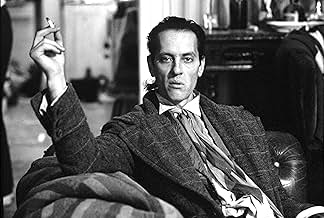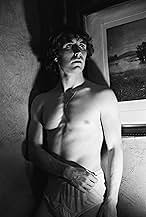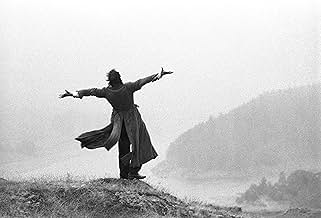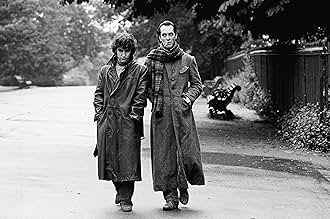1969 ziehen sich zwei drogenabhängige, arbeitslose Schauspieler für einen Urlaub aufs Land zurück, der sich als katastrophal erweist.1969 ziehen sich zwei drogenabhängige, arbeitslose Schauspieler für einen Urlaub aufs Land zurück, der sich als katastrophal erweist.1969 ziehen sich zwei drogenabhängige, arbeitslose Schauspieler für einen Urlaub aufs Land zurück, der sich als katastrophal erweist.
- Auszeichnungen
- 1 Gewinn & 1 Nominierung insgesamt
Joyce Everson
- Lady in Tea Room
- (Nicht genannt)
Alecia St Leger
- Lady in Tea Room
- (Nicht genannt)
Fred Wood
- Man In Cafe
- (Nicht genannt)
Handlung
WUSSTEST DU SCHON:
- WissenswertesThe first preview screening appeared to be a total disaster - the audience sat there stony-faced, never laughing once. It was only after the screening had concluded that a distraught Bruce Robinson discovered that the audience was comprised entirely of non-English speaking German tourists who were all staying at a hotel nearby.
- PatzerWhen Withnail puts his boots in the oven to dry, he opens the iron door with a stick because it will be hot. When he closes it, he uses his hand and doesn't even flinch.
- Crazy CreditsThe end credits contain the following: "...& I Paul McGann" The triple dots are as it follows Richard E. Grant's credit as Withnail (hence matching the movie title). While McGann's character's name is never referenced in the movie, either spoken or written, it has been identified as Marwood in materials issued in relation to the movie.
- Alternative VersionenThe original cinema version of this film was shorter than the one that has since been released on video, laserdisc and DVD. Changes include:
- Marwood's opening voice-over has been redubbed.
- Marwood's speech about his thumbs having gone weird has been cut. The scene thus goes from the line "I don't feel good" to "Look at my tongue".
- Withnail's "I'm gonna pull your head off" has been cut.
- Danny's anecdote about The Coalman has been cut.
- Some dialogue concerning Withnail's current work and Marwood also being a thespian has been cut out of the scene at Monty's home.
- The scene of Marwood slipping in the mud and then angrily persuading Withnail to have another look at the shed has been cut.
- The first part of Withnail and Marwood's conversation with the major, concerning Withnail having been in the Territorials, has been cut. The scene in this version simply dissolves from Withnail and Marwood walking to the pub with Marwood's voice-over to the major bringing up the subject of Jake. Marwood's line about why Withnail lied to the major has understandably also been cut.
- The word Saveloy has been redubbed to Sausage.
- SoundtracksA Whiter Shade of Pale
Performed by King Curtis
Written by Keith Reid, Gary Brooker and Matthew Fisher (uncredited)
1969 Published by Westminster Music Ltd.
Original Sound Recording made by Warner Bros. Records
Ausgewählte Rezension
Withnail and I is set in an old, run down student flat in London's Camden Town at the end of the 1960's. Withnail and I are a couple of unemployed actors from different ends of the social spectrum.
Withnail is a Harrow educated dilettante, and rather upper crust; his flatmate Marwood is a grammar school boy with a slightly more realistic outlook on life. To escape from the squalor of their grim, unemployed, existence in Camden Town, soaked in a near lethal cocktail of alcohol and drugs, the desperate pair call upon the generosity of Withnail's uncle Montague and secure the use of his cottage in the country for a weekend.
Uncle Monty is an eccentric middle-aged homosexual, who prefers vegetables to flowers. He considers that 'flowers are essentially tarts - prostitutes for the bees', and wears a radish in his buttonhole in preference to a flower. He grows vegetables in pots in his Chelsea house, and makes suggestive references to 'firm young carrots'.
Withnail (excellently played by Richard E. Grant), persuades Uncle Monty (a superb Richard Griffiths) to lend Marwood (a convincing Paul McGann) and him his cottage in the country for the weekend.
Their exploits at the cottage, and in Penrith where they spend their Wellington boot money on booze and try to sober up in a gentile tearoom are memorable, witty and entertaining. The incongruous uncle Monty reciting Baudelaire in the Cumbrian hills, seeking carnal knowledge of Marwood (apparently coerced by the cowardly and treacherous Withnail), are testament to the writing skills and humour of author and director, Bruce Robinson.
The film's soundtrack brings us 'A Whiter Shade of Pale', played by King Curtis on the Saxophone, 'My Friend' and 'Walk hand in Hand', performed by Charlie Kunz, 'Schubert's Piano Sonata in B Flat Major' performed by Leslie Pearson, 'All Along the Watchtower' and 'Voodoo Chile', by Jimi Hendrix, 'Hang Out the Stars in Indiana', performed by Al Bowlly, and 'While My Guitar Gently Weeps', by the late lamented George Harrison, who provided much of the financial backing for this memorable film.
This is a thoroughly entertaining 108 minutes of humorous entertainment, a few too many drinks, a convincing 60's atmosphere, superb performances from the excellent cast, and music to make your heart, and your guitar, gently weep. Thank you, George Harrison.
Withnail is a Harrow educated dilettante, and rather upper crust; his flatmate Marwood is a grammar school boy with a slightly more realistic outlook on life. To escape from the squalor of their grim, unemployed, existence in Camden Town, soaked in a near lethal cocktail of alcohol and drugs, the desperate pair call upon the generosity of Withnail's uncle Montague and secure the use of his cottage in the country for a weekend.
Uncle Monty is an eccentric middle-aged homosexual, who prefers vegetables to flowers. He considers that 'flowers are essentially tarts - prostitutes for the bees', and wears a radish in his buttonhole in preference to a flower. He grows vegetables in pots in his Chelsea house, and makes suggestive references to 'firm young carrots'.
Withnail (excellently played by Richard E. Grant), persuades Uncle Monty (a superb Richard Griffiths) to lend Marwood (a convincing Paul McGann) and him his cottage in the country for the weekend.
Their exploits at the cottage, and in Penrith where they spend their Wellington boot money on booze and try to sober up in a gentile tearoom are memorable, witty and entertaining. The incongruous uncle Monty reciting Baudelaire in the Cumbrian hills, seeking carnal knowledge of Marwood (apparently coerced by the cowardly and treacherous Withnail), are testament to the writing skills and humour of author and director, Bruce Robinson.
The film's soundtrack brings us 'A Whiter Shade of Pale', played by King Curtis on the Saxophone, 'My Friend' and 'Walk hand in Hand', performed by Charlie Kunz, 'Schubert's Piano Sonata in B Flat Major' performed by Leslie Pearson, 'All Along the Watchtower' and 'Voodoo Chile', by Jimi Hendrix, 'Hang Out the Stars in Indiana', performed by Al Bowlly, and 'While My Guitar Gently Weeps', by the late lamented George Harrison, who provided much of the financial backing for this memorable film.
This is a thoroughly entertaining 108 minutes of humorous entertainment, a few too many drinks, a convincing 60's atmosphere, superb performances from the excellent cast, and music to make your heart, and your guitar, gently weep. Thank you, George Harrison.
Top-Auswahl
Melde dich zum Bewerten an und greife auf die Watchlist für personalisierte Empfehlungen zu.
- How long is Withnail and I?Powered by Alexa
Details
- Erscheinungsdatum
- Herkunftsland
- Offizieller Standort
- Sprachen
- Auch bekannt als
- Withnail y yo
- Drehorte
- 57 Chepstow Place, Bayswater, Westminster, Greater London, England, Vereinigtes Königreich(Withnail and Marwood's flat)
- Produktionsfirmen
- Weitere beteiligte Unternehmen bei IMDbPro anzeigen
Box Office
- Budget
- 1.100.000 £ (geschätzt)
- Bruttoertrag in den USA und Kanada
- 1.544.889 $
- Weltweiter Bruttoertrag
- 1.950.623 $
Zu dieser Seite beitragen
Bearbeitung vorschlagen oder fehlenden Inhalt hinzufügen


































